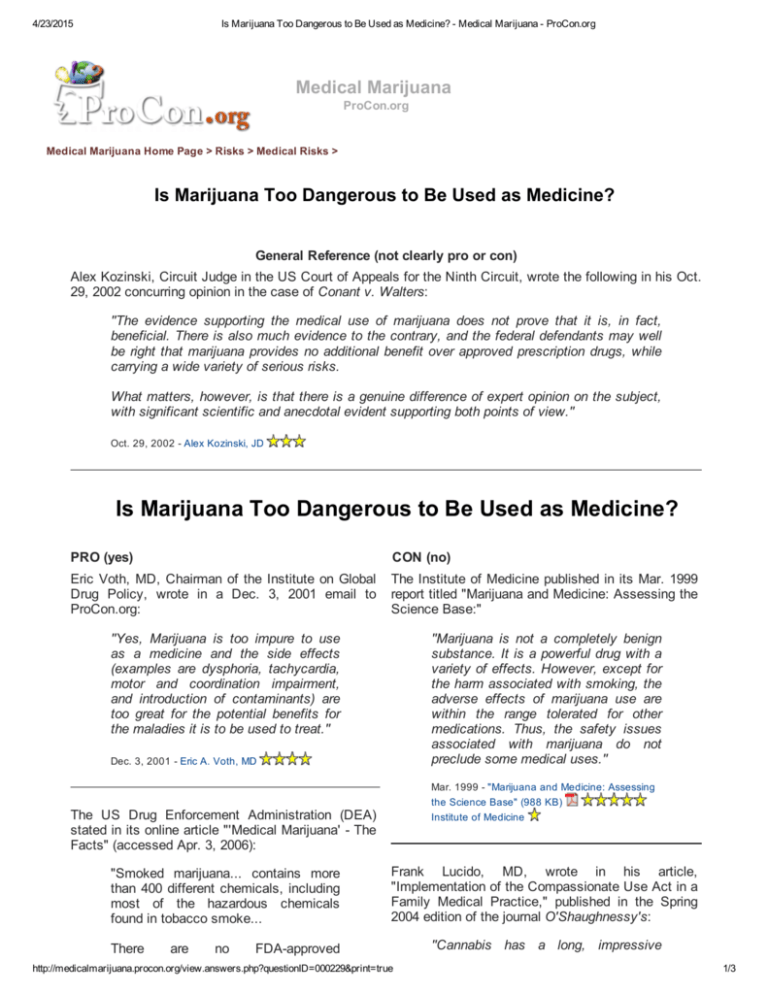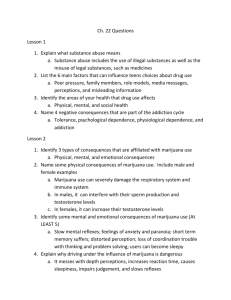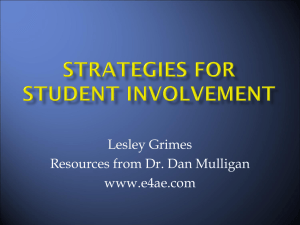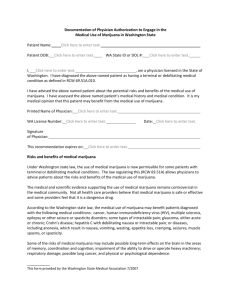
4/23/2015
Is Marijuana Too Dangerous to Be Used as Medicine? ­ Medical Marijuana ­ ProCon.org
Medical Marijuana ProCon.org
Medical Marijuana Home Page > Risks > Medical Risks >
Is Marijuana Too Dangerous to Be Used as Medicine?
General Reference (not clearly pro or con)
Alex Kozinski, Circuit Judge in the US Court of Appeals for the Ninth Circuit, wrote the following in his Oct.
29, 2002 concurring opinion in the case of Conant v. Walters:
"The evidence supporting the medical use of marijuana does not prove that it is, in fact,
beneficial. There is also much evidence to the contrary, and the federal defendants may well
be right that marijuana provides no additional benefit over approved prescription drugs, while
carrying a wide variety of serious risks. What matters, however, is that there is a genuine difference of expert opinion on the subject,
with significant scientific and anecdotal evident supporting both points of view."
Oct. 29, 2002 ­ Alex Kozinski, JD Is Marijuana Too Dangerous to Be Used as Medicine?
PRO (yes)
CON (no)
Eric Voth, MD, Chairman of the Institute on Global
Drug Policy, wrote in a Dec. 3, 2001 email to
ProCon.org:
The Institute of Medicine published in its Mar. 1999
report titled "Marijuana and Medicine: Assessing the
Science Base:"
"Yes, Marijuana is too impure to use
as a medicine and the side effects
(examples are dysphoria, tachycardia,
motor and coordination impairment,
and introduction of contaminants) are
too great for the potential benefits for
the maladies it is to be used to treat."
"Marijuana is not a completely benign
substance. It is a powerful drug with a
variety of effects. However, except for
the harm associated with smoking, the
adverse effects of marijuana use are
within the range tolerated for other
medications. Thus, the safety issues
associated with marijuana do not
preclude some medical uses."
Dec. 3, 2001 ­ Eric A. Voth, MD Mar. 1999 ­ "Marijuana and Medicine: Assessing
the Science Base" (988 KB) Institute of Medicine The US Drug Enforcement Administration (DEA)
stated in its online article "'Medical Marijuana' ­ The
Facts" (accessed Apr. 3, 2006):
"Smoked marijuana... contains more
than 400 different chemicals, including
most of the hazardous chemicals
found in tobacco smoke... There are no Frank Lucido, MD, wrote in his article,
"Implementation of the Compassionate Use Act in a
Family Medical Practice," published in the Spring
2004 edition of the journal O'Shaughnessy's:
FDA­approved
http://medicalmarijuana.procon.org/view.answers.php?questionID=000229&print=true
"Cannabis has a long, impressive
1/3
4/23/2015
Is Marijuana Too Dangerous to Be Used as Medicine? ­ Medical Marijuana ­ ProCon.org
medications that are smoked. For one
thing, smoking is generally a poor way
to deliver medicine. It is difficult to
administer safe, regulated dosages of
medicines in smoked form. Secondly,
the harmful chemicals and carcinogens
that are byproducts of smoking create
entirely new health problems. There
are four times the level of tar in a
marijuana cigarette, for example, than
in a tobacco cigarette."
history as a safe and effective
medicine....
Possible benefits might include
improved symptom relief, fewer side
effects, and/or lower cost than many
commonly prescribed
pharmaceuticals."
Spring 2004 ­ O'Shaughnessy's Frank Lucido, MD Apr. 3, 2006 ­ US Drug Enforcement
Administration (DEA) John Walters, Director of the US Office of National
Drug Control Policy, wrote in a Sep. 27, 2004 article
in the National Review:
Lester Grinspoon, MD, Professor of Psychiatry at
Harvard Medical School, stated in his article "The
Medical Marijuana Problem," published in Cannabis
Health in Mar./Apr. 2006:
"There are many thousands of patients
who currently use cannabis as a
medicine... There is no question about
its safety. "The truth is, there are laws against
marijuana because marijuana is
harmful. With every year that passes,
medical research discovers greater
dangers from smoking it, from links to
serious mental illness to the risk of
cancer, and even dangers from in utero
exposure. In fact, given the new levels of
potency and the sheer prevalence of
marijuana (the number of users
contrasted with the number of those
using cocaine or heroin), a case can be
made that marijuana does the most
social harm of any illegal drug."
Sep. 27, 2004 ­ Office of National Drug Control
Policy (ONDCP) John P. Walters It is one of humanity's oldest
medicines, used for thousands of years
by millions of poeple with very little
evidence of significant toxic effects. More is known about its adverse
effects than about those of most
prescription drugs."
Mar./Apr. 2006 ­ Lester Grinspoon, MD Joycelyn Elders, MD, former US Surgeon General,
wrote the following in a Mar. 26, 2004 editorial
published in the Providence Journal in Rhode Island:
"Marijuana does not need to be
smoked. Some patients prefer to eat it,
while those who need the fast action
and dose control provided by inhalation
can avoid the hazards of smoke
through simple devices called
vaporizers.
For many who need only a small
amount ­­ such as cancer patients
trying to get through a few months of
chemotherapy ­­ the risks of smoking
are minor."
The California Narcotics Officers' Association
(CNOA) stated in its position paper "The Use of
Marijuana as a Medicine," published on its website
(accessed Oct. 8, 2003):
"Common sense dictates that it is not
good medical practice to allow a
substance to be used as a medicine if
that product is not FDA­approved,
ingested by smoking,
Mar. 26, 2004 ­ Joycelyn Elders, MD made up of hundreds of different
chemicals,
not subject to product liability
regulations,
Mollie Fry, MD, told ProCon.org in an Apr. 7, 2006
interview:
http://medicalmarijuana.procon.org/view.answers.php?questionID=000229&print=true
2/3
4/23/2015
Is Marijuana Too Dangerous to Be Used as Medicine? ­ Medical Marijuana ­ ProCon.org
exempt from quality control
standards,
"I took an oath to do no harm. If a
doctor is willing to give you a
prescription for a drug that is addictive
or could kill you, then why should you
not be able to choose a non­toxic drug
like marijuana?"
not governed by daily dose
criteria,
offered in unknown strengths
(THC) from 1 to 10+ percent,
and
Apr. 7, 2006 ­ Mollie Fry, MD self­prescribed and self­
administered by the patient."
Ethan Russo, MD, Senior Medical Advisor at the
Cannabinoid Research Institute, wrote in a Dec. 3,
2001 email to ProCon.org:
Oct. 8, 2003 ­ California Narcotics Officers
Association (CNOA) The Eagle Forum stated in its online brochure,
"Facts You Need to Know About ... Marijuana,"
(accessed Mar. 31, 2006):
"Cannabis has been used by man for
5,000 years or more, with no well­
documented cases of attributable
mortality."
Dec. 3, 2001 ­ Ethan Russo, MD "Medical evidence has proven that
marijuana is highly dangerous, in and
of itself. It seriously harms the brain,
the chromosomes, the sex and
reproductive organs, the hormones, the
lungs, and the immune system....
There is no legitimate need for
marijuana as medicine...
Cancer patients receiving
chemotherapy often die from infection
because chemotherapy weakens the
body's immune defenses. THC
reduces the nausea experienced by
chemotherapy patients, but can be
dangerous to these patients because
THC also damages the immune
system"
Mar. 31, 2006 ­ Eagle Forum ©ProCon.org, a 501(c)(3) nonprofit
All rights reserved
233 Wilshire Blvd., Suite 200, Santa Monica, CA 90401
Tel: 310­451­9596 Fax: 310­393­2471
http://medicalmarijuana.procon.org/view.answers.php?questionID=000229&print=true
3/3


![[H1]Researching Society with MicroCase Online](http://s3.studylib.net/store/data/007737973_2-9d35b9e42208c660471ccaa373bd3b78-300x300.png)




